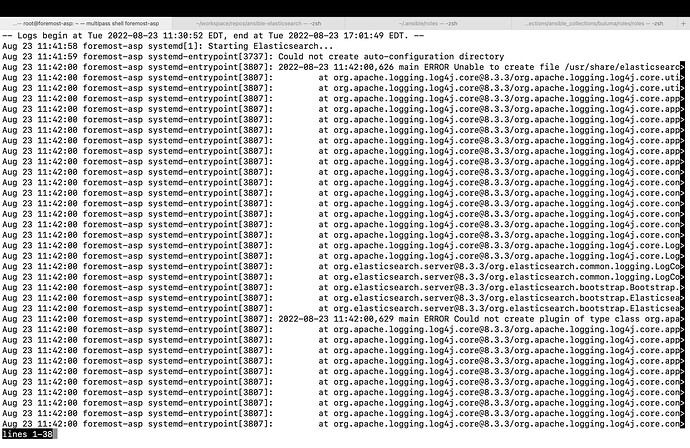Hello guys,
I have trouble installing and configuring my elasticsearch 8.x on Ubuntu 20.04 with ansible role.
I am getting an error of Could not create auto-configuration directory with main ERROR Unable to create file /usr/share/elasticsearch/logs/elasticsearch_server.json java.io.IOException.
my ansible playbook:
apt:
update_cache: yes
force_apt_get: yes
cache_valid_time: 3600
- name: Upgrade all packages on servers
apt:
upgrade: dist
force_apt_get: yes
# Installing necessary packages
- name: Add required dependencies.
apt:
name:
- apt-transport-https
- gnupg2
- wget
state: present
- name: Import the Elasticsearch PGP Key
shell: |
wget -qO - https://artifacts.elastic.co/GPG-KEY-elasticsearch | sudo apt-key add -
args:
warn: no
- name: Add repository defiition
copy:
dest: /etc/apt/sources.list.d/elastic-{{ elasticsearch_version }}.list
content: |
deb https://artifacts.elastic.co/packages/{{ elasticsearch_version }}/apt stable main
- name: Update apt repo and cache on Ubuntu vm
apt:
update_cache: yes
force_apt_get: yes
cache_valid_time: 3600
- name: Install Elasticsearch
apt:
name: elasticsearch
state: present
update_cache: yes
# configure elasticsearch port and host details
- name: configure elasticsearch.yml file
template:
src: "{{ item | basename }}.j2"
dest: "{{ item }}"
# src: elasticsearch.yml.j2
# dest: /etc/elasticsearch/elasticsearch.yml
owner: elasticsearch
group: elasticsearch
mode: '0660'
with_items:
- /etc/elasticsearch/elasticsearch.yml
- /etc/elasticsearch/jvm.options
notify: restart elasticsearch
- name: reload systemd configuration
systemd:
daemon_reload: true
# Start Elasticsearch
- name: Start Elasticsearch service
service:
name: elasticsearch
state: started
enabled: yes
# make sure elasticsearch is running
- name: Make sure Elasticsearch is running before proceeding.
wait_for:
host: "{{ elasticsearch_network_host }}"
port: "{{ elasticsearch_http_port }}"
delay: 3
timeout: 300
configuration file
# ======================== Elasticsearch Configuration =========================
#
# NOTE: Elasticsearch comes with reasonable defaults for most settings.
# Before you set out to tweak and tune the configuration, make sure you
# understand what are you trying to accomplish and the consequences.
#
# The primary way of configuring a node is via this file. This template lists
# the most important settings you may want to configure for a production cluster.
#
# Please consult the documentation for further information on configuration options:
# https://www.elastic.co/guide/en/elasticsearch/reference/index.html
#
# ---------------------------------- Cluster -----------------------------------
#
# Use a descriptive name for your cluster:
#
#cluster.name: my-application
#
# ------------------------------------ Node ------------------------------------
#
# Use a descriptive name for the node:
#
#node.name: node-1
#
# Add custom attributes to the node:
#
#node.attr.rack: r1
#
# ----------------------------------- Paths ------------------------------------
#
# Path to directory where to store the data (separate multiple locations by comma):
#
#path.data: /path/to/data
#
# Path to log files:
#
path.logs: {{ path_to_logs }}
# ----------------------------------- Memory -----------------------------------
#
# Lock the memory on startup:
#
#bootstrap.memory_lock: true
#
# Make sure that the heap size is set to about half the memory available
# on the system and that the owner of the process is allowed to use this
# limit.
#
# Elasticsearch performs poorly when the system is swapping the memory.
#
# ---------------------------------- Network -----------------------------------
#
# By default Elasticsearch is only accessible on localhost. Set a different
# address here to expose this node on the network:
#
network.host: {{ elasticsearch_network_host }}
#
# By default Elasticsearch listens for HTTP traffic on the first free port it
# finds starting at 9200. Set a specific HTTP port here:
#
http.port: {{ elasticsearch_http_port }}
#
# For more information, consult the network module documentation.
#
# --------------------------------- Discovery ----------------------------------
#
# Pass an initial list of hosts to perform discovery when this node is started:
# The default list of hosts is ["127.0.0.1", "[::1]"]
#
discovery.seed_hosts: []
#
# Bootstrap the cluster using an initial set of master-eligible nodes:
#
#cluster.initial_master_nodes: ["node-1", "node-2"]
#cluster.initial_master_nodes: ["node-1"]
# For more information, consult the discovery and cluster formation module documentation.
#
# --------------------------------- Readiness ----------------------------------
#
# Enable an unauthenticated TCP readiness endpoint on localhost
#
#readiness.port: 9399
#
# ---------------------------------- Various -----------------------------------
#
# Allow wildcard deletion of indices:
#
#action.destructive_requires_name: false
defaults/main.yml
---
# defaults file for elasticsearch
elasticsearch_version: '8.x'
elasticsearch_network_host: localhost
elasticsearch_http_port: 9200
path_to_logs: /usr/share/elasticsearch/logs
elasticsearch_heap_size_min: 1024m
elasticsearch_heap_size_max: 1024m
